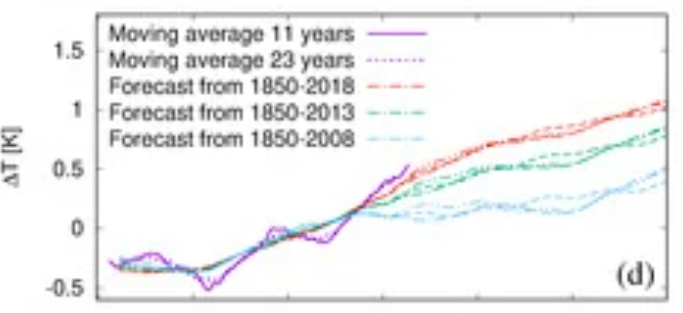In its most recent video, German site Die kalte Sonne here looks at a paper on CO2 climate forcing by Stefani 2021: Solar and Anthropogenic Influences on Climate: Regression Analysis and Tentative Predictions. The results point to only a moderately warming planet up to the year 2150. 
Figure 9d of Stefani 2021. Scenario with a mild decarbonization scheme
To hype up climate warming alarm, IPCC scientists like to exaggerate CO2’s power to trap heat and warm up the atmosphere. But with every assessment report that the IPCC issues, the estimated value by which CO2 warms the planet steadily gets reduced as the observed warming keeps lagging behind what earlier models predicted.
In his paper, Frank Stefani and his team at the Helmholtz Center, Institute of Fluid Dynamics in Dresden, Germany looked at the impacts by CO2 and solar activity.
On average 1.1°C warming
Using double regression, the scientists evaluated linear combinations of the logarithm of the carbon dioxide concentration and the geomagnetic aa index as a proxy for solar activity. They reproduced the sea surface temperature (HadSST) since the middle of the 19th and ended up with a a climate sensitivity (of TCR type) in the range of 0.6 K until 1.6 K per doubling of CO2. The midpoint of this range is 1.1°C, a value many critical climate scientists have already estimated earlier, and thus far below the IPCC scary estimates.
The paper’s abstract elaborates further:
The solution of the double regression is quite sensitive: when including data from the last decade, the simultaneous occurrence of a strong El Niño and of low aa values leads to a preponderance of solutions with relatively high climate sensitivities around 1.6 K. If these later data are excluded, the regression delivers a significantly higher weight of the aa index and, correspondingly, a lower climate sensitivity going down to 0.6 K. The plausibility of such low values is discussed in view of recent experimental and satellite-borne measurements. We argue that a further decade of data collection will be needed to allow for a reliable distinction between low and high sensitivity values.”
Imminent temperature drop cannot be excluded
They write further:
We make a first attempt to predict the aa index and the resulting temperature anomaly for various typical CO2 scenarios. Even for the highest climate sensitivities, and an unabated linear CO2 increase, we predict only a mild additional temperature rise of around 1 K until the end of the century, while for the lower values an imminent temperature drop in the near future, followed by a rather flat temperature curve, is prognosticated.”
Prof. Fritz Vahrenholt also recently discussed Stefani’s paper, see here.





The AMO has been positive for 30+ years and will almost certainly turn -ve within 10 years. What will happen then?
[…] From the NoTricksZone […]
[…] From the NoTricksZone […]
[…] From NoTricksZone […]
[…] From the NoTricksZone […]
[…] German Paper: “A Mild Additional Temperature Rise Of Around 1°K”… Drop Not Exclud… […]